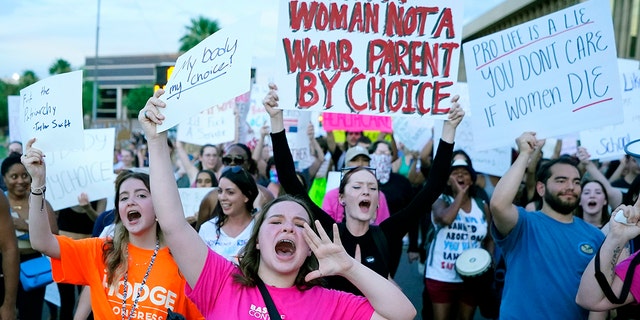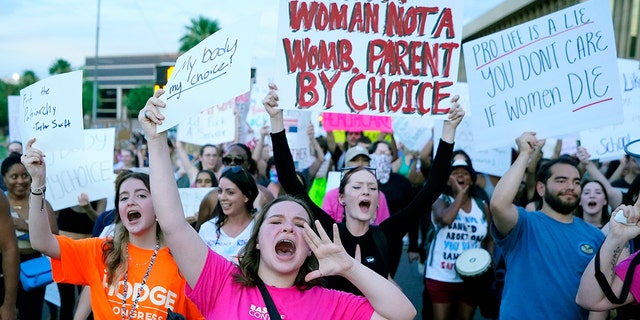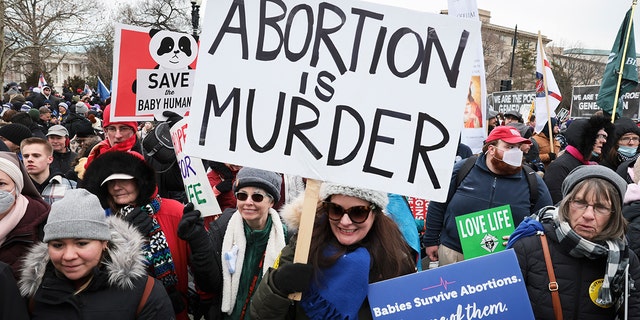
NEWYou can now listen to Fox News articles!
A Wall Street Journal poll indicates that Americans’ support for abortion increased in the months since the Supreme Court overturned Roe v. Wade precedent that recognized a nationwide right to terminate pregnancies.
The rise in support for abortion could affect the November midterm elections with voters viewing abortion as a more important issue than it has been in previous elections.
The WSJ poll found that support for abortion increased five percentage points, from 55% in March to 60% in August among all likely voters.
But a vast majority of Democrats (83%) said the ruling in Dobbs v. Jackson Women’s Health Organization this summer would make them more likely to vote in the November midterm elections, and 53% of independent voters said the same.
POLL: DEMOCRATS’ MIDTERM CHANCES IMPROVE WHILE INFLATION AND ABORTION REMAIN TOP ELECTION ISSUES

Protesters shout as they join thousands marching around the Arizona Capitol in Phoenix after the Supreme Court decision to overturn the landmark Roe v. Wade abortion decision June 24, 2022. (AP Photo/Ross D. Franklin)
The poll echoed other recent polling indicating that abortion is not the most important issue for voters when compared to economic concerns like inflation, but abortion did come out as the top reason that would make voters turn out in November, according to the WSJ survey.
“Abortion is not an issue that most people, prior to Dobbs, spent a lot of time thinking about,” said Molly Murphy, a Democratic pollster who helped conduct the WSJ poll with Republican Tony Fabrizio. “What Dobbs has done is, one, we’ve had a national conversation about it. Two, it has gone from hypothetical to real.”
REPUBLICAN SENATE CANDIDATES HIT BACK ON ABORTION ATTACK ADS FROM DEMOCRATS
When asked about specific restrictions, only 30% supported abortion bans after 15 weeks (except in cases of rape, incest or medical emergency), and 27% said they supported a ban after six weeks of pregnancy. The numbers dropped from there, with only 10% saying abortion should be illegal in all cases, according to the poll.

Anti-abortion activists participate in the 49th annual March for Life as they march past the U.S. Supreme Court Jan. 21, 2022, in Washington, D.C. (Win McNamee/Getty Images)
“The truth of the matter is, even among Republicans, there isn’t a clear consensus. They want restrictions. The question is what restrictions and how far should they go,” Fabrizio told WSJ.
Republicans seeking office across the country have been hitting back at Democratic opponents who try to paint them as having extreme pro-life positions and clarifying their pro-life positions. Tiffany Smiley, the GOP candidate challenging Sen. Patty Murray, D-Wash., said in a recent ad that “I’m pro-life, but I oppose a federal abortion ban.”
Senate candidate Blake Masters in Arizona responded to an attack ad by saying Democrats have more extreme abortion positions since many do not say there should be any limits on abortion.
Masters accused Democratic Sen. Mark Kelly of lying about his abortion views in an ad that said the Republican “supports a total abortion ban. Rape. Incest. No exceptions.”
CLICK HERE TO GET THE FOX NEWS APP
“Mark Kelly votes for the most extreme abortion laws in the world,” Masters responded in his own video last week, stating that the Womens’ Health Protection Act that Kelly supports is “more extreme than Western Europe, it’s way more extreme than what Arizonan’s want.”
The Wall Street Journal survey was conducted August 17-25, 2022 with a margin of error of 2.7 percentage points.








